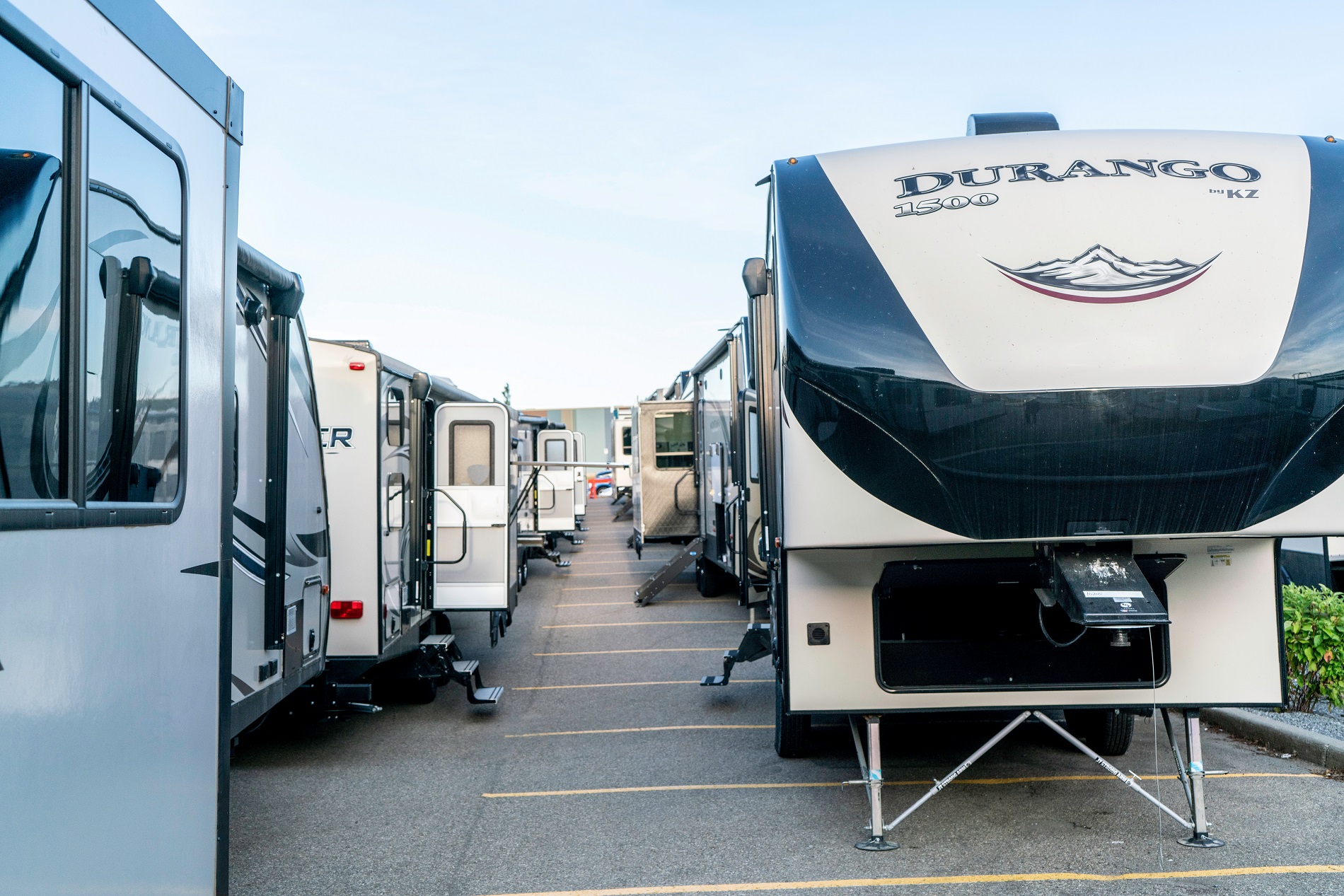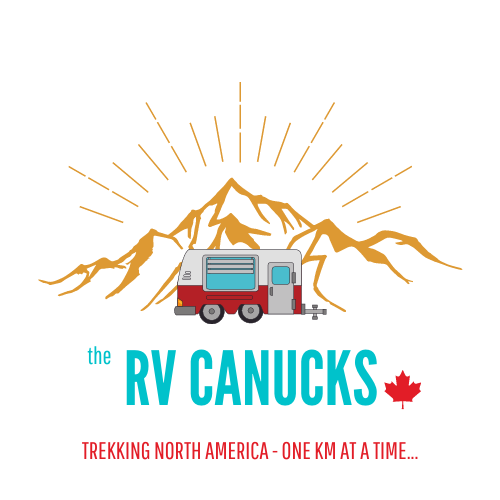What to Know Before You Buy a New or Used RV | Episode 22

Purchasing an RV can be an overwhelming, emotional, expensive, and exciting experience. With a little forethought and preplanning, you can usually balance all those feelings and make a purchase that will feel more like a strong investment than a big expense.
Don’t Rush the Process
Decisions need to be made on what kind of RV or trailer, what if any tow vehicle you will need and what your current and future needs are. You can certainly rush and buy a unit in a week. What I will advocate for is that you take some time to do your research. If you’re in RV’ing for any length of time this really becomes an ongoing process where you enjoy seeing what’s new in the market and take stalk of your personal life so that when you’re ready to pull the trigger you have all your homework done.
Know What You Want
Figuring out what kind of RV or trailer you want is the first decision that needs to be made. You don’t need to pick the exactly type or model. You just need to figure out whether you’re looking for a motorhome, travel trailer or fifth wheel.
Motorhomes
Motorhomes can offer a lot more luxury and might be suitable for larger families. They can also be suitable for longer trips or people who want to live in them for several months at a time. A couple big things to keep in mind is that its another vehicle that needs maintenance (oil changes, brakes etc.) and you will probably want a towed vehicle to make day trips unless you plan to pack up every time you leave the campsite.
Travel Trailers
Travel trailers come in a multitude of layouts and sizes and are one of the most common way to RV. You can get into to a trailer for less money than a motorhome and if you pick the right size it has a better chance of being stored at home in the summer.
Fifth Wheels
Fifth wheels have lots of models and layouts, but you will always need to own a pickup truck to tow it. And when you do tow it you will lose all the bed storage. The upside is that you can get some of the luxury that motorhomes offer and still have a vehicle for day trips. While this can all seem overwhelming one solution to confirm your choice is to rent what you think you want. For a lot less money than buying you can either confirm your choice is right, needs tweaking or that you were wrong and need to consider something else altogether.
Which Comes First: The Tow Vehicle or the Trailer?
If you decide to go the way of a travel trailer or 5th wheel the next consideration is whether you’re going to tow with your existing vehicle or are going to get a new one. In some respects, this becomes a question of whether the chicken or the egg came first? If you had already planned to replace your vehicle in the next 1-2 years regardless of whether you were going to buy a trailer or not, then I would suggest you start by purchasing the tow vehicle. If you do that then you know what you can tow and that will probably give you more purchasing options. It will also help to prevent awkward conversation with your spouse of you “know I think we need a new vehicle.” Here’s few other things to think about. Chances are this vehicle will be your daily driver so make sure it fits with the rest of your life when you’re not RVing. At 6.5’ truck box is a little more cumbersome to grab milk at Walmart with than one with 5.8’ box. Do you need 4×4 or AWD? How many people do you seat belts for? What features do you want? It goes without saying that you should get a tow package, but do you need inverters, back up camera etc. The last word of wisdom here is that an 8-year-old truck or SUV that can tow 5000lbs according to the manufacturer probably can’t. Vehicles lose efficiency every year. I used to be able to run 4-minute kilometer… same body and bones but just less efficient.
Let’s Talk About Money
Once you know what you’re towing with and you know what you’re purchasing let talk about the budget. The money budget is between you, your better half, and the bank. You also have a weight budget. You can only tow so much weight so make sure you understand that very carefully. There could be a whole other article on it. The other budget is your length budget. How long a trailer do you want? That’s determined by your comfort level, RV needs and storage options. Know this though that the longer your unit the fewer options you will have for campsites. Don’t get me wrong you will find spot, but it will be tougher to get than quiet little waterfront site on your favourite lake. The little know upside though is that often a longer trailer is more forgiving when you back it up. Staying within the money budget is always a lot easier than the other two so make sure you think about length and weight before you show up buy a unit.
Buying a New Vs. Used RV
Regardless of the RV type you buy you can go new or used. There’s no wrong way but know that buying a newer RV might actually only be a fewer dollars less. Take the lower cost of a comparable used unit and bump it up against the knowledge that you have a warranty, you know its whole history and spread the cost difference over 10 years, and you’ll find you might want new one because the cost is actually not that much more. If you purchase an older used RV beware of rotten floors or water damage so you might want to consider an RV inspection. Again, though a used unit might right depending on the maintenance history and how handy you are. For lots of people spending some money on used unit and taking it to the end of its natural life might be right. The last piece of advice is to research the wholesale value of the used RV you want. That will help you know if the price is fair. The retail will always be higher than the wholesale price. A wholesale will always be lower than a well-maintained unit. The point is that you don’t want to be so stubborn that you lose the right unit because you won’t go over wholesale when negotiating price.
Purchasing can be an exhausting process. But do your best to enjoy that process. Enjoy shopping and looking at units because its OK to spend a few minutes looking at some thing way put of your league. Bring the kids to make sure they fit in the beds and get them an ice cream on the way home if they behave themselves. At the same time though manage your expectations.
Buying an RV is not the same as getting a car or truck. Buy for service as much as price. Dealers will always service what they sell first and at some time you will need service. Make sure you get a full walk through on pick up. This can take several hours if done properly (don’t bring the kids on this day). If you live in a northern climate know that the warranty starts the day you take delivery. If you pick up in October, it sits in the snow all winter and then you start using it in May you’ve burned 7-8 months of warranty going nowhere. Know to though that everybody wants spring delivery as soon as the robins show up so does everybody who wants a trailer so make sure you talk to your salesperson about that. Know also that while production is 12 months of the year and dealers can order 12 months of the year many dealers will place a larger order 1-2 times a year because the supply chain is built on guessing what consumers want. I didn’t design it, but the point is to speak with the salesperson early to place your order and deposit you can get what you want and not what’s left over. Finally, if you live in Canada beware the exchange rat and know that the prices can fluctuate on exact models or different model years. Some dealers will average it across all units, and some won’t. Prices can even be affected by local economy and demand. Do your research. If you travel for price you may need to travel for service unless the dealer is in a dealer network. Similarly, I wouldn’t hesitate to travel a little further just to get good service.
Buying an RV is a continuous process. Enjoy doing research and talking to people about what they have as well as their likes and dislikes. You need to know what your needs are now but what they might be later. Will your kids going to be 5” taller in two years and bringing friends or will you be an empty nester? As much as possible think about expansion and contraction. Maybe a larger RV is right for a young family to grow into, so they don’t need purchase again in 3 years. Conversely, maybe a family with teenagers needs a larger used unit for just a few years until Mom and Dad retire and get a small dream motorhome. Maybe the vehicle you’re planning to buy is not for your current unit but is instead for the next bigger one. RVing is all about family and experiences. Having and uncomfortable RV or the wrong vehicle is going to take away from those experiences so don’t rush into something.
About The Author
Related Posts
Backwoods Nutrition with Terri Ney | Ep. 35
Today, we’re joined by Terri Ney to talk about Nutrition, how to pack…
You Don’t Need to Be Handy to RV – Here’s Why | Ep 30
Today’s episode is all about that sweet RVing life, when you may not…
Error: API requests are being delayed for this account. New posts will not be retrieved.
There may be an issue with the Instagram access token that you are using. Your server might also be unable to connect to Instagram at this time.


